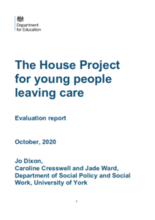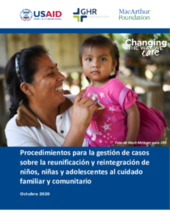Displaying 201 - 210 of 953
The International Care Leavers Convention brought together Care Leavers at an international level to amplify the voices of children and young people and provide them with a platform to learn, share and exchange experiences, knowledge and challenges. This document highlights some key takeaways from the event.
This study used the 2000–2017 waves of the Adoption and Foster Care Analysis and Reporting Systems. The authors identified foster care entries among children removed from their homes because of parental drug use (PDU) and calculated the number of entries for each year. They also identified foster care discharges achieved through parental reunification among children removed from their homes each year.
This article presents empirical results from a study (2015–2018) on young people leaving care in Luxembourg. A special focus deals with the processes of transitioning from care to work.
Drawing on a review of recent international literature, this article argues for the first time that an understanding of, and engagement with, the theory and practice of friendship is essential to working alongside those who have care experience.
This systematic review synthesizes information about the relationships aging out foster youth have with their birth or stepparents after legally mandated separations in foster care.
This systematic review synthesizes information about the relationships aging out foster youth have with their birth or stepparents after legally mandated separations in foster care.
The aims of the study were to (a) describe families who had participated in the Home Parenting Education and Support (HoPES) programme, (b) describe the key education content and support activities of the programme, and (c) identify the enablers and challenges in implementing HoPES.
This report presents findings from an evaluation of the House Project (HP) in the U.K., which aims to improve outcomes for young people (in accommodation, education, employment and training (EET), wellbeing, autonomy and integration) and service level outcomes for young people leaving care aged 16 and over.
Los Procedimientos de Manejo de Casos para la Reunificación y Reintegración de los Niños, Niñas y Adolescentes al cuidado Familiar y Comunitaria se desarrollaron a través de talleres participativos en conjunto con la Secretaría de Bienestar Social (SBS), la Procuraduría de la Niñez y la Adolescencia (PNA) de la Procuraduría General de la Nación (PGN), El Organismo Judicial (OJ), El Consejo Nacional de Adopciones (CNA), la Asociación de Hogares Cristianos de Guatemala (ASOCRIGUA) y Hogar Aldeas de Esperanza. Se basó en el trabajo de Changing the Way We Care de Kenia en la Guía para trabajadores sociales: Manejo de casos para la reintegración de niños y niñas en cuidado familiar o comunitaria, adaptada al contexto guatemalteco.
The purpose of the research is to generate learning and recommendations to develop public policies to support the transition of adolescents and youth from the alternative care system to autonomous life in Argentina, Bolivia, Brazil, Colombia, Mexico and Peru.




